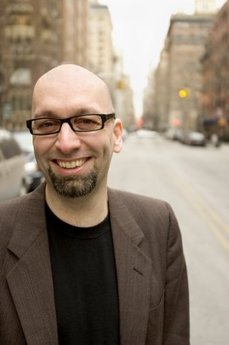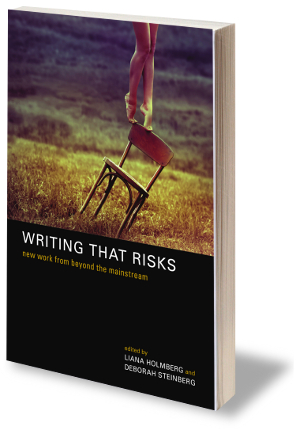Red Bridge Press author David Dickerson talks with editor Deborah Steinberg about experimental fiction and his love of comics and puzzles.

David Ellis Dickerson’s story “Display Wings” opens the forthcoming Red Bridge Press anthology Writing That Risks. It’s a whimsical and poignant piece about a museum docent desperately trying to reorganize the museum’s collections according to a new system of categorization while a rebel army might or might not be on its way to burn the place down. Dickerson is a regular contributor to This American Life on NPR, and has published a memoir, multiple works of short fiction, and essays in places as diverse as The Atlantic Monthly and Year’s Best Fantasy and Horror. He teaches composition, creative writing, and African-American literature, and also draws comics.
Deborah Steinberg: Your memoir, House of Cards, is about working as a greeting card writer for Hallmark as a young MFA graduate. Since then, you’ve been a frequent contributor to NPR’s This American Life and you draw comics. How do these more mainstream pursuits relate to your interest in experimental fiction?
David Dickerson: The uniting element is surprisingly simple: humor. I got into greeting cards because I liked drawing cartoons and writing light verse. I got into telling funny stories on the radio in the same way. And my favorite experimental fiction authors are the ones who are funny, from the classic purveyors like Italo Calvino and Donald Barthelme to modern geniuses like Aimee Bender and Karen Russell. To my mind, a well-executed experimental fiction is a sort of joke or puzzle that exists to satirize readerly conventions.
The other way the mainstream pursuits relate to experimental fiction is a little sadder: they fund it. Experimental fiction rarely hits the bestseller lists. Those of us who love it have to pursue it as a sideline, and I’m very fortunate that most of my sidelines also involve writing.
Deborah Steinberg: Your memoir, House of Cards, is about working as a greeting card writer for Hallmark as a young MFA graduate. Since then, you’ve been a frequent contributor to NPR’s This American Life and you draw comics. How do these more mainstream pursuits relate to your interest in experimental fiction?
David Dickerson: The uniting element is surprisingly simple: humor. I got into greeting cards because I liked drawing cartoons and writing light verse. I got into telling funny stories on the radio in the same way. And my favorite experimental fiction authors are the ones who are funny, from the classic purveyors like Italo Calvino and Donald Barthelme to modern geniuses like Aimee Bender and Karen Russell. To my mind, a well-executed experimental fiction is a sort of joke or puzzle that exists to satirize readerly conventions.
The other way the mainstream pursuits relate to experimental fiction is a little sadder: they fund it. Experimental fiction rarely hits the bestseller lists. Those of us who love it have to pursue it as a sideline, and I’m very fortunate that most of my sidelines also involve writing.
“The Distance of the Moon” quite literally saved my creative sanity

 RSS Feed
RSS Feed
